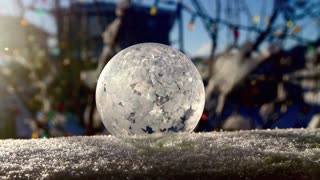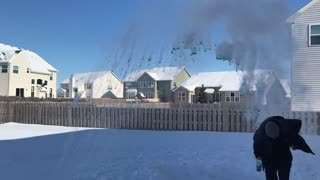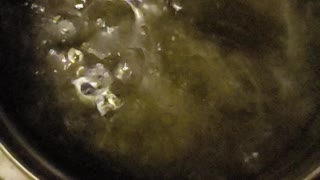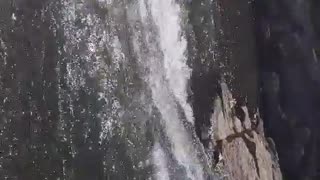The Magical Moment When Boiling Water Freezes Instantly Into White Powder
This video is a real proof that science is awesome! Even those of you who didn’t fancy this subject at school, this video is guaranteed to change your mind and sweep you off your feet! There is only one thing to do on -27 degrees Celsius in Canada. Trek down to the lake with boiling water to make instant ice mist in the beautiful wilderness!
This spectacular video filmed in slow-motion captures the ice mist and makes up for an absolutely breathtaking spectacle, showing the beauty of nature at its finest! Who knew that something so fun could come out of something so cold!
Every winter, one of the coolest trends is to throw cups of boiling water into the air. Amazingly, once the water leaves the cup it immediately turns into "snow." Check out this video and see what happens!
There is science behind this magical experiment! The water is rapidly evaporating into vapor that immediately condenses into a cloud. The moment water is thrown into the air, the liquid disappeared in a big, short-lived cloud. Amazing!
Boiling water is closer to evaporating than cold water, so when you throw extremely hot water into a very cold, very dry atmosphere the smallest droplets are able to cool and evaporate in a dramatic cloud before they reach the ground. The experiment works best when the air temperature and dew point are far below zero.
Some people claim that hot water freezes faster because a pot of boiling water can be thrown into the air on a cold winter day, and it freezes in mid air creating a shower of ice crystals. Whereas a pot of cold water thrown into the air comes down as large blobs of water.
If a pot of boiling water is thrown into the air on a cold winter day it freezes in mid-air creating a shower of ice crystals. That is the surprising result because the hot water is so close to becoming steam and the act of throwing it into the air causes it to break up into tiny droplets. Magic!
The small water droplets have a large surface area which allows for a great deal of evaporation, this removes heat quickly. The cooled droplets are so small, that they can be easily frozen by the winter air. All of this happens before the water hits the ground. Cold water doesn't break up into such small pieces when thrown into the air, so it comes down in large blobs.
-
 0:28
0:28
rumblestaff
4 years agoSoap bubble freezes instantly in real-time
1.16K2 -
 0:10
0:10
rumblestaff
5 years agoBoiling water instantly turns into snow in Chicago's extremely cold weather!
384 -
 0:12
0:12
PaulRimmer
3 years ago $0.01 earnedMagical Water Park
3665 -
 0:51
0:51
Buzzvideos - EN
3 years agoMagical moment woman swims with rays
91 -
 0:54
0:54
rljmb23
5 years ago $21.29 earnedWater instantly vaporized during Chicago's polar vortex
13.2K -
 2:38
2:38
Buzzvideos - EN
3 years agoMagical moment manta ray meets divers
33 -
 2:38
2:38
Buzzvideos - EN
3 years agoMagical moment manta ray meets divers
868 -
 0:27
0:27
Solomon1977
3 years ago $0.01 earnedSuper slow mo boiling water
73 -
 0:21
0:21
strief284
3 years agoWhite water rapids
811 -
 0:51
0:51
Buzzvideos - EN
3 years agoMagical moment woman swims with manta rays
8